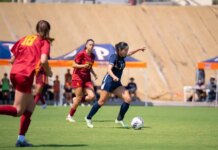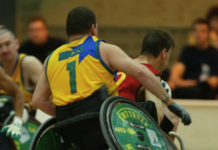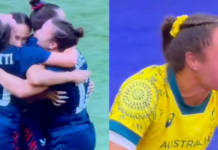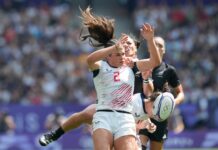Jack Gill, a three-sport athlete at Catholic Memorial, and Colmn Gilroy, who wants to play basketball at Archbishop Williams, have been barred from competing in any sport this year, even though each has had the opportunity to play only three years of high school athletics. Both had temporarily left their hometown schools to attend the Carroll School,which specializes in helping students with learning disabilities.
“For the MIAA, whose entire mission is to support high school athletics because of their importance in the educational experience, to come out with a ruling like this is unconscionable,” Archbishop Williams president Dennis Duggan said. “It reeks of disability discrimination by a group that I know does not intend that.”
Get Sports Headlines
The Globe’s most recent sports headlines delivered to your inbox every morning.
Colmn Gilroy (left) and Jack Gill both attended the Carroll School, which specializes in helping students with learning disabilities.Jessica Rinaldi/Globe Staff
The MIAA said it has applied its strict new waiver rule fairly, with the goal of eliminating abuses by schools seeking to extend students’ athletic eligibility to a fifth year. Hundreds of students at Bishop Fenwick High were barred from postseason play because of what the MIAA deemed repeated and egregious violations of the rule. Many more at other schools have also been affected.
Bishop Fenwick has protested to no avail, but the case of the two students with diagnosed learning disorders may prove harder to defend. The dispute raises questions about whether the MIAA, a powerful governing body trying to correct course after decades of controversy over its eligibility decisions, has gone too far by banning waivers even in special cases — and whether the organization has violated the spirit of its own stated commitment to non-discrimination.
In rejecting waiver applications for Gill and Gilroy, the MIAA stated the rulings were “not appealable.”
“This is a system without due process,” said Gilroy’s mother, Marcella Sliney.
Gill and Gilroy, both 18, have dyslexia, which causes difficulty reading, writing, and spelling. Because they attended the Carroll School through the ninth grade, then entered mainstream high schools as ninth graders, the MIAA summarily rejected their eligibility applications under its new waiver rule. The regulation prohibits waivers for students who voluntarily repeat a grade.
“The MIAA membership approved this rule change by an overwhelming vote of 311-24-11,” the association said in a statement. “As a result, the rule has been consistently applied to all students who have demonstrated proof of passing grades and earned enough credits to advance to the next academic grade level.”
The crackdown, a priority of MIAA executive director Bob Baldwin since he took office in 2021, has been applauded by school administrators, many of whom had long advocated for leveling playing fields by restricting private schools in particular from bolstering their rosters with older players.
Duggan said Archbishop Williams has long supported the MIAA and approves of its effort to curb inappropriate fifth-year waivers.
“We strongly contend, however, that this rule does not apply in Colmn’s case or in the case of any other similarly situated Carroll School graduates,” Duggan said.
Repeating a grade at issue
According to the Carroll School and the boys’ neuropsychologists, Gill and Gilroy were not educationally prepared to enter mainstream high schools after they completed the eighth grade at the private learning center in Wayland.
Dr. Renee Greenfield, the head of the Carroll School, said both boys needed intensive remedial work in the center’s ninth-grade program. Their placement in the ninth grade at mainstream MIAA schools rather than the 10th grade was “academically and developmentally appropriate,” she said.
Steven Wilkins, a former head of the Carroll School who is familiar with both boys’ cases, said the MIAA, by denying them waivers, engaged in a “discriminatory practice.”
When Gilroy entered the Carroll School as a fourth grader, he could not spell the word “the,” and Gill could barely read at a third-grade level when he joined Gilroy there in the eighth grade, their parents said. Gilroy continued to struggle so significantly in Carroll’s ninth grade that the school shifted him to a pass/fail format.
For either boy to enter a mainstream school as a 10th grader would have been educationally unfeasible, according to their parents, clinicians, and school officials.
“Repeating is not a choice for kids with learning disabilities,” Sliney said. “If you’re not ready to do the work, you repeat.”
The Carroll School also advised the parents of Peter Gellene, one of Gill and Gilroy’s classmates, that he would benefit from repeating the ninth grade in a mainstream school. When Gellene enrolled at Catholic Memorial, his mother, Beth Gellene said, “We had no idea that going from the ninth grade at a specialized school to CM would render Peter a fifth-year senior who would need a waiver to compete in his final year of high school.”
To ensure that Gellene, a college basketball prospect, could compete in his final year of high school, his parents enrolled him at Bridgton Academy in Maine, which competes in a private school league that did not restrict his eligibility.
As for Gilroy, he went from the Carroll School to St. Joseph Prep in Brighton, where Eugene Ward, the head of school at the time, agreed with the Carroll School that the only option was to place him in the ninth grade. Gilroy attended St. Joseph Prep from the ninth through 11th grades before the school closed and he transferred to Archbishop Williams.
Ward said he had “no doubt” that Gilroy belonged in the freshman class at St. Joseph Prep because “the ninth grade experience at the Carroll School was not comparable to what SJP offered.” In fact, Ward said, he was “keenly aware that even with all the support we were able to put in place, there was no guarantee of success” for Gilroy as a ninth grader at the Catholic school.
Duggan said Ward’s analysis underscores his view that “the real issue here is whether that extra remedial year at the Carroll School was a ninth-grade year under any reasonable definition.”
The answer, Duggan said, “is clearly no.”
The MIAA concluded otherwise. The organization asserted that public high schools would not have accommodated the boys, as private schools did, by permitting them to repeat the ninth grade.
Consequently, Gill and Gilroy have had the opportunity to play only three years of high school sports because the Carroll School does not offer interscholastic athletics for ninth graders.
“Kids get to play four years of high school sports,” said Gill’s mother, Jacqueline Gill. “All we want is our kids to get their four years.”
The MIAA countered that many students are limited to three years of high school sports for various reasons, including medical setbacks. However, memories are still fresh of private schools across the state managing to secure an outsized share of fifth-year waivers to bolster their team rosters.
For much of the MIAA’s 44-year history, member schools blamed the organization for allowing their competitors to pit older, fifth-year players against less experienced and less physically developed opponents.
Then came the crackdown. Had Archbishop Williams and Catholic Memorial submitted their waiver requests before the strict new rule took effect this year, Gill and Gilroy may have had the opportunity to present their cases to an MIAA eligibility appeals board, as others were able to do, including the Fenwick baseball players whose case factored in the unprecedented punishment of the Catholic school in Peabody.
The value of participation
Since 2021-22, the MIAA has rejected at least 39 waiver requests from private schools for students the association determined had voluntarily repeated a grade. Gill and Gilroy are among those sidelined.
“I understand there are people who have abused this whole system and have tried to get a competitive advantage,” Jacqueline Gill said. “I get that it’s a massive problem. But kids with learning disabilities are not the ones the MIAA should be going after.”
Jack Gill, who lives in Foxborough, had never played football, competed in track and field, or wrestled competitively before he entered Catholic Memorial as a ninth grader. By his junior year, he was a backup linebacker on CM’s Division 2 state championship football team as well as a shot put and discus thrower in outdoor track and field. As a wrestler, he was a team captain and a Catholic Conference all-star.
Catholic Memorial, which like many private MIAA schools has permitted students to voluntarily repeat a grade, ultimately accepted the rejection of Gill’s waiver.
“It’s unfortunate that due to the denial Jack cannot participate in our athletic program this year, but we will continue to support him and all our Carroll School graduates as valued and committed members of our school community,” Catholic Memorial said in a statement.
Gilroy, who lives in South Boston, played middle school baseball and basketball at the Carroll School. At St. Joseph Prep, he focused solely on basketball as he grew to 6 feet 7 inches. Last year, he averaged 8.5 points and 7.9 rebounds in helping SJP post a 22-2 record and reach the Division 4 state title game.
Neither boy is considered a Division 1 college athletics prospect, but their families and school leaders said that playing sports is vital to their social and educational development.
Duggan said of Gilroy, “This is a child who is still overcoming his disability. The high school he loved went out of business his senior year. He found a new place that he’s now calling home, and he’s doing the best he can to integrate himself into the school, but the thing he loves best has been taken away from him.”
Gilroy’s last chance to play high school basketball draws near. Gill already has lost his senior football season. The wrestling season starts soon, followed by track and field.
The boys’ parents have appealed for help to the state attorney general’s office and elected officials, so far without success. Family advisers have recommended they sue the MIAA, but the families said they cannot bear the expense after the high cost of the Carroll School and private school tuition payments.
“We’re at the point now,” Jacqueline Gill said, “where we’re just praying that this somehow gets sorted out before the winter season.”
Bob Hohler can be reached at [email protected].
Source link : https://www.bostonglobe.com/2023/11/17/sports/miaa-eligibility-learning-disabilities/
Author :
Publish date : 2023-11-17 08:00:00
Copyright for syndicated content belongs to the linked Source.




















































